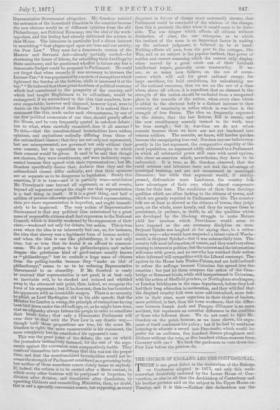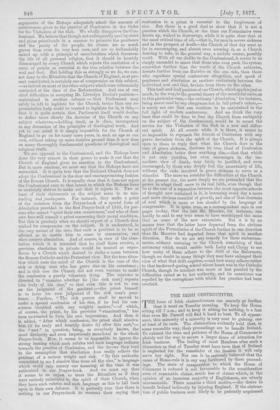THE CHURCH OF ENGLAND AND THE CONFESSIONAL.
1 HERE is one great defect in the declaration of the Bishops on Confession adopted in 1873, and only this week somewhat doubtfully endorsed by the Lower House of Con- vocation, as also in all that the Archbishop of Canterbury and his brother prelates said on the subject in the Upper House on Tuesday, and it is this :—Neither this declaration nor the arguments of the Bishops adequately admit the amount of countenance given to the practice of Confession in the Order for the Visitation of the Sick. We wholly disapprove the Con- fessional. We believe that though not unfrequently used by strict and pious priesthoods in a manner to promote the penitence and the purity of the people, its abuses are so much graver than even its very best uses, and are so indissolubly mixed up with a principle of sacerdotalism which threatens the life of all personal religion, that it should be heartily discouraged by every Church which rejects the mediation of a caste of priests as essential to the true relation between the soul and God. But holding this as strongly as we do, we can- not deny to the Ritualists that the Church of England, as at pre- sent constituted, is certainly one of compromise on this subject, —as indeed on most of the other subjects which wore vehemently contested at the time of the Reformation. And one of our chief difficulties in accepting Mr. Llowelyn Davies's position— maintained in another column — that Parliament may safely be left to legislate for the Church bettor than any re- presentative body could be trusted to legislate for it, is this,— that it is quite certain that Parliament itself would decline to define more clearly the doctrine of the Church on any subject whatever,—holding itself, as it does, incompetent to any discussion of the principles of theological truth. And yet to our mind it is simply impossible for the Church of England to go on for many more years, in such an age as our own, without taking up more decisive ground than it now does on many thoroughly fundamental questions of theological and religious truth. We are opposed to the Confessional, and the Bishops have done the very utmost in their power to make it out that the Church of England gives no sanction to the Confessional. But in mere candour, we must say that the Bishops have not succeeded. It is quite true that the National Church does not adopt the Confessional in the clear and uncompromising fashion of the Roman Church. It is equally clear that it does not reject the Confessional even to that'extent to which the Bishops have so anxiously striven to make out that it rejects it. Two at least of their statements on the subject seem to us mis- leading and. inadequate. For instance, they make a point of the omission from the Prayer-book of a special form of Absolution provided in the first Prayer-book of 1549, for por- tions who cannot "quiet their own consciences," and who of their own free-will consult a priest concerning their moral condition. But this is precisely what we should expect of a Church that wished for compromise on the subject. It is understood, in the very nature of the case, that such a penitent is to bo so advised as to enable him to come to communion, and there receive absolution. And of course, in view of the abso- lution which it is intended that he shall there receive, a previous absolution in private would be treated as super- fluous by a Church which desired to strike a mean between the Roman Catholic and the Protestant view. But the true situa- tion which tests the mind of the Church is the case of the sick or dying man who has grave sins on his conscience ; and in this case the Church did not even venture to make the confession a purely voluntary thing. The minister is directed to " examine whether ho [the sick man] repents him truly of his sins," so that even this is not to rest on the judgment of the penitent ;—the priest himself is to form his own judgment of the sick man's peni- tence. Further, " The sick person shall be moved to make a special confession of his sins, if he feel his con- science troubled with any weighty matter,"—of which, of course, the priest, by his previous " examination," has been instructed to form his own impressions. And then it is added, " After which confession, the priest shall absolve him (if he truly and heartily desire it) after this sort,"— the " sort " in question, being, as everybody knows, the most distinctly and even imperiously sacerdotal in the whole Prayer-book. Now, it seems to us impossible to ignore the strong leaning which such rubrics and such language indicate towards the practice of Confession, and the favour they lend to the assumption that absolution does really relieve the penitent of a serious weight and risk. " By this authority committed to me I absolve thee from all thy sins," is language which could only convey one meaning, at the time it was authorised in our Prayer-book. And we must say that it seems to us unjust to treat the Ritualists as if they were entirely unfaithful to the spirit of their Church, when they have such rubrics and such language as this to fall back upon in their own defence. It is perfectly true that there is nothing in our Prayer-book to warrant their saying that confession to a priest is essential to the forgiveness of sins. But there is a good deal to show that it is not a practice which the Church, at the time our Formularies were drawn up, wished to discourage, while it is quite clear that at the most critical time of all,—that is, for men in severe sickness and in the prospect of death—the Church of that day went as far in encouraging, and almost even securing it, as a Church desiring to take, in the general way, a middle course, possibly could. With all our dislike to the Confessional, it seems to us simply uncandid to assert that those who even push the system somewhat further than the words of the Church authorise, deviate further from our Rubrics on the one side, than those who repudiate special confessions altogether, and speak of penitence and absolution as matters exclusively between the individual soul and God, deviate from them on the other. This half-and-half position of our Church, which applies just as much, by the way, to the general theory of the sacerdotal caste, as to this particular case,—the ordinary ' Absolution,' for instance, being never read by any clergyman not in full priest's orders,— is surely not one that can continue to be maintained in the full light of modern controversy. And we think the very least that could be done to free the Church from ambiguity ou the subject of the Confessional, would be to recast the service for the Visitation of the Sick in a new and differ- ent spirit. At all events while it is there, it seems to us impossible to reproach the friends of Confession with any grave deviation from the spirit of the Church. It is always open to them to reply 'that what the Church does in the case of grave sickness, discloses its true ideal of Confession and Absolution better than anything else,—that that which it not only justifies, but oven encourages in the im- mediate view of death, may fairly be justified, and even encouraged, by those who deeply feel the uncertainty of life, without the risks involved in grave sickness to servo as a stimulus. The more we consider the difficulties of the Church at the present day, the more deeply we are persuaded that the power to adapt itself anew to its real faith, even though that be at the cost of a separation between the most opposite schools of thought now contained in it, is becoming every day a more and more obvious essential of growth, and also of that clearness of soul which is more or less clouded by the language of compromise. It is quite true, as a correspondent says in our pages to-day, that the late i/tr. Maurice, for instance, can hardly be said in any true sense to have worshipped the same God as some of the new extremists. But it is by no means true that the latter have departed from the obvious spirit of the Formularies of the Church further in one direction than Mr. Maurice had departed from that spirit in another direction. Nor do we see any remedy for these embarrass- ments, without restoring to the Church something of that autonomy which would enable both Laity and Clergy to see how many of them adhere to the drift of the Reformers, though no doubt in many things they may have enlarged their view of what that drift requires,—and how many adhere rather to that backward-gazing school whose heart was in the Catholic Church, though its intellect was more or less puzzled by the difficulties raised as to her authority, and its conscience was repelled by the corruptions with which her practice had been overlaid.



































 Previous page
Previous page